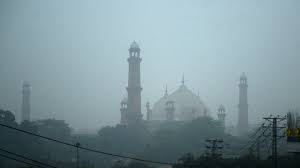Rida Zahra
“Heavy hearts, like heavy clouds in the sky, are best relieved by the letting of a little water”. These words are by American journalist and poet Christopher Morley but quite fitting the scenario of the heart of Pakistan-Lahore that has been heavy with clouds of smog all over it. The situation isn’t quite different on the other side of the border as well. The Punjab Government did let some water relieve the heart of Pakistan with artificial rain in surrounding districts of Lahore. But the question arises till when we will be resorting to artificial rainfall and the closure of smoke emanating schools. There is a dire need of proper action and implementation of environmental friendly policies while complying with laws. There are various key point indicators that need proper attention, such as environmental protection, air quality control, and public health to tackle smog and air pollution in Pakistan.
If we look into details of the legal framework available for tackling environmental pollution in Pakistan, the laws include Pakistan Environmental Protection Act (PEPA), 1997, Punjab Environmental Protection Act, 2012, Climate Change Policy, 2012 and Policy on Controlling Smog 2017 which lay down the foundational legislation governing environmental protection in Pakistan. Smog in Pakistan is primarily caused by industrial activities, vehicle emissions, crops burning, and dust storms. PEPA is tasked with monitoring and controlling pollution, including air pollution, while establishing air quality standards. This law also mandates the preparation of environmental impact assessments (EIA) for projects that tend to impact air quality. It also includes provisions for the control of industrial and vehicular emissions. To specify permissible limits for various pollutants, PEPA introduces National Environmental Quality Standards (NEQS) for particulate matter in the air, such as Carbon Monoxide (CO), Sulfur Dioxide (SO2), Nitrogen Oxides (NOx), and Ozone.
PEPA. 2012 specifically is applicable in the province of Punjab, which is often highlighted owing to smog-related issues and particularly, Lahore. This act aims to establish provincial air quality standards and empowers the Punjab Environmental Protection Department (PEPD) for monitoring air pollution levels. This act also addresses industrial emissions, vehicular emissions, and the impact of crop burning on air quality. Moreover, for regulating vehicular emission, Pakistan Standards and Quality Control Authority (PSQCA) and Motor Vehicles Ordinance, 1965 are applicable. Punjab Government is also introducing measures to ban the burning of crops. The Climate Change Policy, 2012, was introduced that outlined the government’s commitment to reducing air pollution and addressing climate change, which is linked to smog. It includes provisions for enhancing air quality monitoring systems and taking steps to mitigate emissions from industrial and agricultural sources.
The question arises here that if there is a robust legal framework available in Pakistan then why the enforcement is not so achievable. There are multiple factors behind it, such as absence of adequate enforcement and monitoring mechanisms, lack of harmony and coordination between federal and provincial governments. Awareness of masses is most critical because in rural areas crops burn while in urban regions vehicular emissions cause smog and air pollution. Carpooling should be opted for in the urban arrangements to decrease fuel consumption and carbon emissions. Whereas farmers need to be trained regarding disposal of unwanted crops. Having said that, the infrastructure available in Pakistan is also very limited for pollution control. Political and economic pressure on the country adds further fuel to fire. Thus, enforcement of these laws remains inconsistent, which is causing the situation to worsen a bit more every passing year. All segments of society need to contribute to let the heart of Pakistan not get heavy with clouds of smog every winter. All key sectors of agriculture, transportation and industry need effective policies to reduce Carbon emissions. Tree plantation drives are needed as well because they are rightly called the lungs of earth and tend to protect us from environmental pollution. Artificial jungles are always better preventive measures than resorting to artificial rains as a coping mechanism. Let’s not let the heart of Pakistan sink in the clouds of smog.



